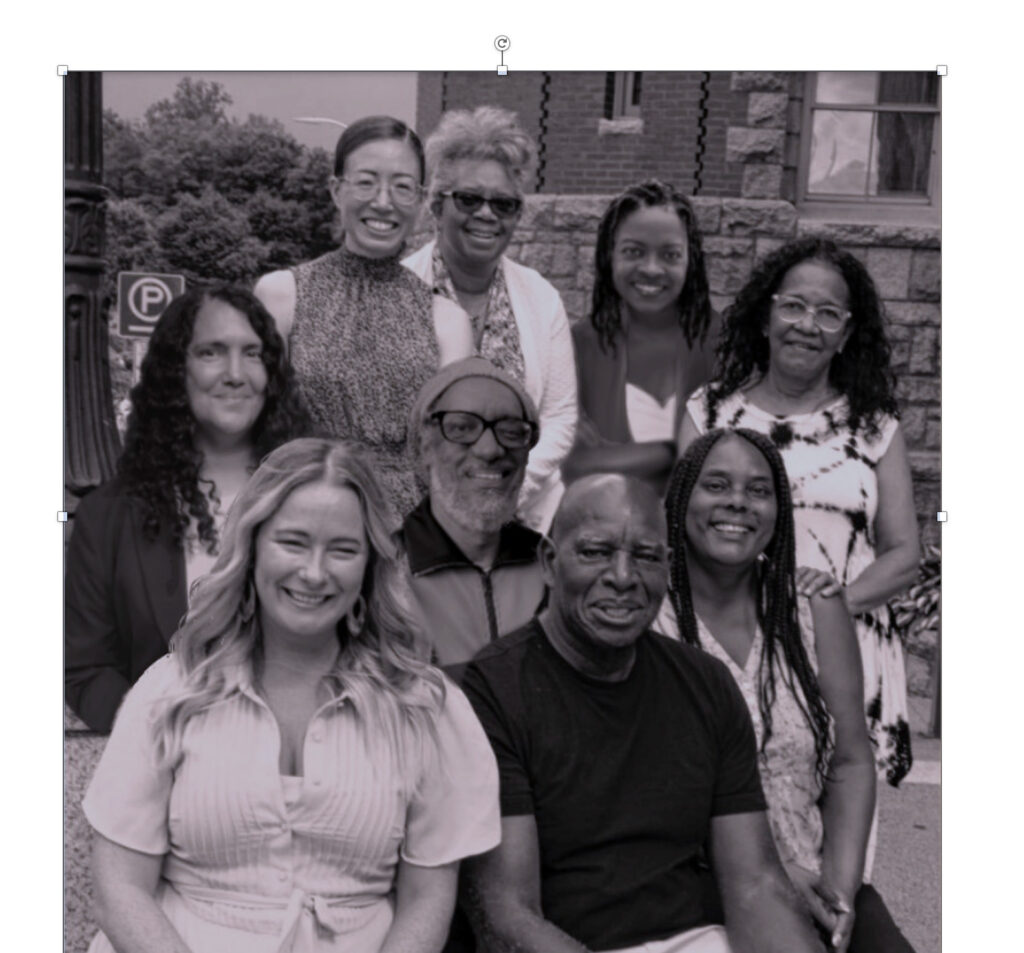African Heritage Reparations Assembly Final Report Prioritizes Youth Services, Affordable Housing, and Aid to Black-Owned Businesses

Amherst's African Heritage Reparations Assembly. (back row L-R): Heather Hala Lord, Alexis Reed, Pamela Nolan Young, Yvonne Mendez, Debora Bridges. (front row L-R): Michele Miller, Amilcar Shabazz, Irv Rhodes, Jennifer Moyston. Photo: African Heritage Reparations Assembly
The African Heritage Reparations Assembly (AHRA) released its final report with its recommendations for compensating residents of Amherst, especially descendants of enslaved people, who have been harmed by racist practices in Amherst and the country as a whole. The 160-page report contains a history of slavery and racism, results of the townwide survey on racism, and suggestions for ways to accelerate the creation of the $2 million reparations fund approved by the Town Council so that it can be accomplished within four years.
The AHRA recommends concentrating the local reparations efforts on youth services, affordable housing, and aid to Black- owned businesses and to prioritize Amherst residents of African heritage who are descendants of those enslaved in Amherst.
The AHRA recommends concentrating the local reparations efforts on youth services, affordable housing, and aid to Black-owned businesses. It also advocates for special legislation to permit the fund to allow cash payments to individuals. It recommends that the fund prioritize Amherst residents of African heritage who are descendants of those enslaved in Amherst, followed by descendants of those enslaved elsewhere, and finally those of African heritage who are not descendants of enslaved people.
Specific recommendations are to establish a youth-led BIPOC youth empowerment center, help promote affordable homeownership and rentals, and direct the next round of ARPA funds to Black-owned businesses. There are also recommendations to the Amherst schools, UMass, and Amherst College to rectify past and current practices of structural racism.
To assure that the goals of reparations are carried out, the ARHA recommends the creation of a successor body to determine distribution of the funds, as well as a town assembly for Black residents to meet one or two times a year and discuss priorities. The group also urges the town to dedicate a share of Community Preservation Act (CPA) funds and Community Development Block Grant (CDBG) funds toward initiatives to benefit the Black community, at least until the reparations fund is large enough to provide disbursements. Additionally, they recommend application for state, federal, and private grants and the establishment of a nonprofit entity, similar to the Friends of the Jones Library, to be able to accept donations. It also advocates for working for reparations on a national scale.
Other recommended initiatives in the report are:
● Continue and Expand Town-Wide Programming in Truth and Reconciliation
● Publicize the Human Rights Commission’s Complaint Process, and Consider a Town Policy for Public Apology
● Develop a Town Policy for Renaming Streets and Spaces
● Support and Uplift the Work of the Ancestral Bridges Foundations
● Support the Civil War Tablets Exhibition
● Establish a Museum and Genealogical Research Center
● Provide Fair Compensation to Persons Who Contribute to Truth, Reconciliation, DEI, and Other Initiatives
● Dedicate a Significant Share of Second-Round ARPA Economic Development Funds to Black-Owned Businesses
● Provide Assistance to Residents for the Expungement of Cannabis Charges
● Discontinue Low-Level and Pretextual Traffic Stops and Consent Searches
● Provide Resources to the Board of Health to Address Health Inequities
● Adopt a Town Resolution in Support of State and Federal Reparations
Recommendations for other local entities are:
To the Superintendent of Amherst-Pelham Regional Public Schools: Revise history curricula for greater truth-telling.
To the University of Massachusetts: Provide just compensation to Professor Edwin D. Driver.
To Amherst College: Repair and reconcile with descendants of Mrs. Frances Brown.
The Town Council will take up discussion of the report at its October 2 meeting.

Has there been any thought of subrogation?
If reparations for slavery are owed, then what do the freed slaves owe to the White men who fought (and *died*) to free them?
Do not forget that one White male from the North *died* for every ten enslaved persons who were freed.
Two of my Great-Great-Grandfathers fought to free the slaves — one came home without his foot and the other didn’t come home at all. Where does that play into all of this?
All of the arguments about inter generational loss apply here — my Great Grandmother was orphaned by the war, and there was a lot my Great-Great Grandfather couldn’t do without his missing foot.
So what about subrogation?
If the descendants of persons who were enslaved are entitled to compensation, don’t they in turn owe ME compensation for the price my family paid to free them?!?
Of course this whole thing is a violation of the Civil Rights Act of 1964 and will be tossed out on that basis, but (theoretically) those once enslaved would *still* be enslaved but for the sacrifice of my family, don’t they owe me anything for that?
Perhaps, at the very least, we could look up the names of *ALL* the Amherst civil war veterans and honor all of them for “dying to make men free.”